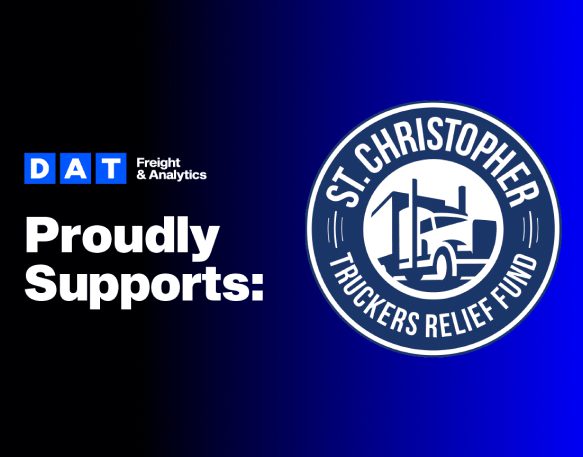Fraud is everywhere. From phishing and spyware to identity theft and hacking, fraud comes at us from every angle, and scammers have more tools at their disposal than ever before. It impacts our personal lives and puts every business in every industry at risk.
DAT is no different. As the operator of North America’s largest on-demand freight marketplace, DAT and our customers are targets for would-be scammers. Over the course of four decades, we’ve built, evolved, and replaced systems to safeguard both our user network and our own internal systems.
But just like in any other platform-based business, criminals attempt to use our network for fraud. That’s where our Network Integrity Unit (NIU) comes in. This includes our Network Governance team of experts who govern North America’s largest on-demand freight marketplace, delivering a secure platform to our valued customers and the freight industry. They meticulously vet DAT user accounts, investigate fraud allegations, and promptly responds to any claims of “bad players” within our network. The NIU also includes teams that oversee internal cybersecurity and others that develop data science to detect and stop fraud before it happens.
While this team has been recognized by law enforcement multiple times for our role in taking down cargo fraud operations, they have largely operated behind the scenes up to this point. As fraud and cybercrime has exploded worldwide across all industries, the team’s efforts to keep our customers safe has garnered more attention.
DAT also partnered with a leading cybersecurity consulting firm, who conducted a thorough assessment and found no evidence of any security breaches. We’re investing in resources and technology to maintain this security and go even further in combating fraud.
To that end, the DAT NIU has grown by 150% in the past two years. We continue to invest as a top priority to ensure we have the most highly trained people with the most sophisticated capabilities to prevent fraud and respond quickly and intelligently when it does happen.
Learn more about the DAT Fraud Protection Program.

What we’ve done to combat fraud
As an industry leader for more than four decades, we’ve put in a lot of miles when it comes to fighting fraud, with 100% of bad actor claims resolved by our Network Integrity Unit. Those efforts have kicked into overdrive in the past several months.
Along with our typical security measures, we’ve instituted new policies, which include:
- Strengthening our monitoring and authentication, including resetting customers’ passwords with new requirements
- Blocking access from numerous foreign countries known to have these issues
- Fortifying our security tools, policies and procedures
- Strengthening bot prevention
- Blocking credit cards of known bad actors
That’s what we’re doing in the background, but we also provide tools that allow users to quickly and accurately vet potential business partners.
- CarrierWatch: A searchable database of more than 500,000 transportation companies used to verify and monitor changes in MC authority, safety ratings, insurance status, and more.
- DAT Directory: A comprehensive list of all DAT customers where companies can verify phone numbers, addresses, DAT numbers, and more in order to avoid phishing attempts. Users can also read and write company reviews.
- Tracking: See exactly where shipments are in real-time with Trucker Tools, complete with a fraud toolkit.
- Invoice factoring: Through our factoring partners, we’re able to show which loads have been pre-approved for factoring, meaning carriers can get paid within 24 hours.
We’re committed to providing the industry with the tools and resources needed to keep our customers informed and protected.
What we’re doing going forward
Scammers and hackers have more tools than ever, so network integrity is our No. 1 investment in 2023.
Below are just a few of the initiatives you’ll see rolled out in the coming weeks.
- Multi-factor authorization on all DAT accounts
- Predictive fraud monitoring developed by our data science team
- Regular testing to identify vulnerabilities
- Further enhancements against unauthorized access
- FBI partnership
3 most common trucking scams
Here is some background of the most common scams that our industry encounters.
1. Double brokering
Double-brokering is when a carrier – or someone posing as one – accepts a load from a broker and then re-brokers that load to a different carrier. Sometimes the party doing the double-brokering is doing so to assist a carrier that doesn’t have the proper operating authority. Other times the double-broker has no intention of paying the carrier. In both instances, it’s illegal.
It’s also probably the most widespread scam in the trucking industry. Double-brokering also tends to increase when trucking markets are in a down cycle. For brokers and shippers, the risks are in not knowing what carrier is actually moving the load, bringing a host of potential financial liabilities. For carriers, the risk is not getting paid for the delivery.
It’s worth noting that double-brokering is different from the practice of “co-brokering,” when two brokerages coordinate resources to arrange transportation for a shipper’s freight. In this instance, all parties (including the shipper) are aware of the arrangement and there are no questions about what carrier is actually hauling the load. There are also “can get” loads, where a shipper has an urgent load that will be awarded to the first broker who can find a truck.
How to protect yourself from double-brokering
DAT is an open marketplace, and we balance that free market with a trusted, secure platform for conducting business. DAT enforces user policies and collaborates with law enforcement and industry partners like the Transportation Intermediaries Association (TIA). Our Network Governance Team resolves 100% of “Bad Player” claims on our platform, and we provide free tools such as the DAT Directory that any broker or carrier can use to vet potential customers and business partners.
In the past year we’ve also made changes to our products to combat double-brokering. One example is a change that adds protections to how comment fields are used, providing prompts whenever a user clicks on a link that would take them away from the DAT One platform.
Below are some best practices for weeding out double-broker attempts.
CARRIERS: Double-check the contact information for any new broker you call. You can verify that info against the Directory in DAT One, and read (and write) reviews for that company. Leaving reviews for brokers you have a good relationship with is also helpful for eliminating double-brokering scams.
When calling on a load, dig into the details. Asking questions about the commodity, pickup and drop-off locations, appointment times, and any other info not only helps you price your services and make better business decisions, but it’s also information a scammer isn’t likely to know.
And if the price for a load seems too good to be true, then that could also be a red flag. DAT customers can stay informed with the most current market rates by using the Quick Rate Lookup tool in DAT One.
BROKERS: Verify that the company you’re talking to is who they say they are. Tools such as the Directory and CarrierWatch in the DAT One platform make it easy to verify phone numbers, MC numbers, insurance, and safety ratings.
The free Directory includes company reviews, so you can see past experiences brokers have had with that carrier. You can cross reference this with the TIA Watchdog report to identify fraudulent carriers.
Ask the caller for the carrier’s cargo insurance policy number. You can then either call the company’s official contact number for the same information or check the insurance certificate on file in CarrierWatch. If the policy numbers match, this caller is more likely to be legitimate.
2. Identity theft
While identity theft has long been associated with individual credit card fraud, businesses have found themselves increasingly targeted. There are a few reasons why a thief might target transportation and logistics companies, given the industry’s size. The motivations could be to steal payments or the cargo itself.
A typical practice among scammers to search outdated phone numbers and addresses they can use to pose as someone they’re not. One common scam is to pose as a carrier in order to request a fuel advance from a broker. Once they receive the money, they disappear.
Similarly, the scammers might use the carrier’s identity to request repair costs, or they might pose as a broker in order to offer a load to a carrier that they have no intention of paying, pocketing all of the payment themselves.
How to protect yourself from identity theft
Ensure all your directory data is up to date, including in the FMCSA and the DAT Directory. This makes it easier for other brokers and carriers to weed out a fraudster who might pretend to be a representative from your business.
Guard your company’s information the same way you would your own bank account info. Don’t share company logins (including your DAT login), and establish strict anti-phishing practices for your business (more on that below).
3. Phishing
One of the tactics a scammer might use to steal someone’s identity is phishing. Look at the spam folder in your email and you’ll likely see thousands of examples. Unfortunately, they’re not always as easy to spot, and no spam filter is 100% accurate. Phishing also isn’t restricted to email.
In most phishing scams, the sender pretends to represent another business or service that you use. They might send a link that is made to look like a legit login page, which they then use to capture your username and password. Scammers are also increasingly using text messages and phone calls to fool users into sharing their info. A recent scam is to send fake messages that claim to be from a company’s CEO.
Increasingly, phishing scams are pretending to represent DAT.
How to protect yourself from phishing
As a partner in your company’s success, we have a shared interest in protecting our network from phishing attacks. Our customers safety and security is one of our top priorities, which is why we are investing heavily in our systems.
We hired a leading cybersecurity firm to perform a detailed assessment of these systems and found no evidence of a security breach. In order to arm our users with more protections, we recently instituted new password requirements to combat phishing attacks, and we’ll soon be instituting multi-form authentication for all DAT accounts.
While we are putting processes in place that make it more difficult for a phishing scammer to access a compromised account, there are still measures you need to take to ensure your DAT accounts are never compromised.
Below are a few best practices to avoid phishing scams:
- Report and delete requests for personal information and passwords (DAT will never call, email, or text individual users requesting their passwords for any reason).
- Do not download files that you do not know – any official communication from DAT will come from an email address that is (at)DAT.com (some scams might attempt to disguise the address as a legitimate one, but you can hover over the link to confirm).
- Be on the lookout for suspicious hyperlinks. If you receive an email asking you to log into your account, go directly to DAT.com.
- Report the fraudulent communication through your organization’s security team and/or email service provider.
- Use longer, complex passphrases – the longer the password, the more difficult to crack.
- Do not share or write down passwords.
- Set a lockout for unsuccessful login attempts.
- Secure your devices.
- Only access secure and safe websites (refer to your organization’s Acceptable Use Policy).
- Utilize firewalls to manage access.
- Turn on email filters.
- Avoid using personal devices.
If you believe you have received a phishing email impersonating DAT, please let us know by sending a screenshot or send us the details in a new email. DO NOT forward the actual phishing email you’ve received from a bad actor.
Other types of cargo fraud
Cargo theft – Scammers who pretend to be trucking companies to take advantage of shippers and brokers by picking up freight and disappearing, stealing the cargo.
Fuel advance scam – When a fraudster steals the identity of a trucking company, books a load with a broker, then requests and receives a fuel advance from the brokerage. Once they receive the money, they disappear, leaving the broker to find another carrier to move the freight. In more egregious cases, they pick up the load and hold it ransom, demanding more money.
Driver-in-need scam / repair costs – This scam generally occurs in truck stops when someone poses as a driver in need of money for repairs. He or she finds out who the broker is by loitering in truck stops and eavesdropping on conversations.
Loads held for payment – This can occur when the carrier decides they want more money for moving the load.
Non-payment of a freight bill – A legitimate carrier hauls a load but does not get paid.
TONU (truck order not used) – A broker books a truck to haul a load, and when the truck arrives they find another carrier has already picked it up.
Think you’re the victim of fraud? Report it to our Network Governance team.


